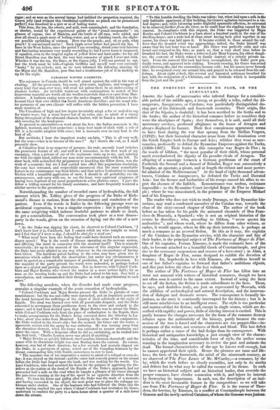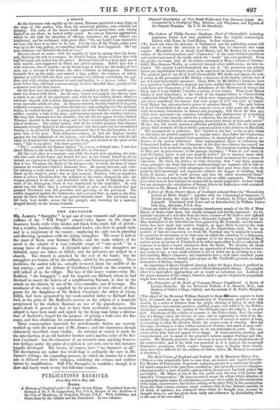THE FORTUNES OF ROGER DE FLOR, OR THE ALMUGAVAES.
Astowo the bands of mercenaries who infested Europe for a consider- able period of the middle ages, a troop, or possibly a tribe, called the Al- mugavars, Amogavares, or Catalans, was particularly distinguished da- ring part of the thirteenth and fourteenth centuries. Their origin, like that of the Gipsies, is doubtful : it has been ascribed to the Goths and to the Arabs • the author of the historical romance before us considers they were the aborigines of Spain ; they themselves, it is said, amid all their mercenary services, professed allegiance to the house of Arragon and always displayed its banner. Their first conspicuous appearance seems to have been during the war that sprung from the Sicilian Vespers, (1282) ; but their historical character arose from their domination over the Greek Empire both in Europe and Asia ; whither they went as mer- cenaries, professedly to defend the Byzantine Emperors against the Turks, (1303-1307). Their leader in this enterprise was Roger de Flor ; in the words of Gibbon, "the most popular of their chiefs, whose personal merit overshadowed the dignity of his prouder rivals of Arragon. The offspring of a marriage between a German gentleman of the court of Frederick the Second and a damsel of Brindisi Roger was successively a Templar, an apostate, a pirate, and at length tile richest and most power- ful admiral of the Mediterranean." At the head of eight thousand adven- turers, Catalans or Amogavares, he defeated the Turks and liberated Asia : but the licence and barbarities of his troops caused his allies to re- gret the absence of the Infidels. • Remonstrance was useless, resistance impossible : so the Byzantine Court inveigled Roger de Flor to Adriano- ple; where he was assassinated, in the presence of the Emperor Michael and of his Empress.
The reader who does not wish to study Ducange„ or the Byzantine his- torians, may read a condensed narrative of the Catalan war, towards the close of the sixty-second chapter of Gibbon. The author of the book before us has taken for his guide the animated chronicle of Don Fran- cisco de llioneada, a Spaniard ; who is not an original historian of the events he describes ; who, according to Gibbon' "never quotes his authorities " ; and whose work, where he differs from other writers, or rather, it would appear, where he fills up their interstices, is perhaps as much a romance as an avowed fiction. Be this as it may, the exploits of the Catalans in the Byzantine service, with the character and fate of their leader, is the principal subject of The Fortunes of Roger de Flor. One of his captains, Fernan Ximenes, is made the romantic hero of the tale, to become attached to a beautiful Greek of Constantinople, and give rise to the necessary suspensions and crosses of a love-story ; as Alme, a daughter of Roger de Flor, seems designed to exhibit the devotion of woman ; for, hopelessly in love with Ximenes, she sacrifices herself to one of her father's captains to forward that father's ambitious objects, and dies just before the close of the last volume.
The author of The Fortunes of Roger de Flor has fallen into an error not unusual with writers of historical romances, though we have not often seen it carried to the same extent. Instead of using the facts to set off the fiction, the fiction is made subordinate to the facts. These, he says, and doubtless truly, are just as represented by Moneada, with the addition of arehmological and natural description, and the interven- tion of dialogue and dramatic scenes. The consequence is formally in- jurious, as the story is continually interrupted for the history ; but it is still more mischievous in an intelligent sense. The style is too particular and matter-of-fact for fiction; and, except in single scenes, which are de- scribed with rapidity and power, little of stirring interest is excited. This is partly because the changes necessary for the form of the romance destroy reliance npon the authenticity of the history, partly because the con- nexion of the two is forced and the characters are too puppet-like—in- struments of the writer, not creatures of flesh and blood. This last defect is perhaps rather a cause of the bad design than its consequence. With historical and antiquarian knowledge, a just enough view of the charac- teristics of the time, and considerable force of style, the author seems wanting in the imagination necessary to revive the past and animate the dead. The formal characteristics of the age he knows well enough, but he cannot apprehend their spirit. Hence the pictures are tame and life- less ; the facts of the fourteenth, the mind of the nineteenth century, as we observed of The Free Lance of Mr. M'Carthy,—a romance, by the by, which the work before us closely resembles, not only in its merits and defects but in what may be called the essence of its theme. In each we have an historical subject and an historical leader, that override the proper romance, have slender connexion with it, and injure its interest by destroying its importance. In each, too, the description of an inci- dent is the most favourable feature in the composition : so we will take one from The Fortune,s of Roger de Flor. It is the rescue of Theo- dora, the heroine, by Ximenes, in a conflict at Constantinople between the Genoese and the newly-arrived Catalans, of whom the Genoese were jealous. A RESCUE.
As the horseman rode rapidly up the street, Ximenes perceived a man lying on the steps. of this portico, who, fium his unnatural position, was evidently. not Lespiely. The noise of the horse's hoofs appeared to arouse him; and, raising on one elbow, he looked wildly round. As soon as Ximenes approached, Which be did with the intention of offering assistance, the poor fellow's eye brightened, and he exclaimed, with great effort, "Oh, my Lord ! I am rejoiced to see yen: but there is no time to be lost. For the love of the Virgin, make your Way up to the long gallery, or something dreadful will have happened. Oh! my poor mistress—we defended the hall as —"
runenes heard no more: with the rapidity of light he sprung from his horse, and, throwing the rein to a trooper, he ordered Ramon Auer to follow him with half his band, and rushed into the palace. He found himself in a large hall, paved with marble, and supported by fluted and gilded columns. Before him was a wide staircase, also ot marble; on the broad steps of which lay the bodies of two men, one a servant of the house, the other evidently an Almugavar. Ximenes instantly flew up the stairs, and entered a long gallery, the windows of which, opening on a level with the floor, gave entrance to a balcony overlooking the gar- dens, and with winding staircases at each end leading to a terrace below. The scene before him, although common enough in those dreadful times, paralyzed for a moment even his firm nerves.
On the floor were the bodies of three men, wounded or dead; the marble pave- ment was floated with blood. An old man, bound and gagged, was thrown upon a conch at one side of the apartment; and, while he was ining frantic efforts to extricate himself, half-a-dozen Almugavars were coolly engaged in appropriating every moveable article of value. As Ximenes entered, one long loud cry of anguish, evidently a woman's voice, rang from the balcony; and, springing over the prostrate bodies, he rushed forward. A group passed one of the windows: it was a Catalan soldier, carrying a lady in his arms, and hurrying towards the winding staircase. Her long hair streamed over his shoulder; but she did not appear to have fainted. Ximenes shouted to the man to stop, and in that commanding tone which is cer- tainof obedience. The soldier turned, with all the terrible passions that disgrace hrunanity strongly depicted in his countenance: but these gave way to concentrated ferocity as he perceived Ximenes, and understood that it was his intention to de- prive him of his prey. With deliberate coolness Ile laid his helpless burden against the low balustrade of the balcony, and still holding her arm with his left hand, he flourished his long sword above his head, and shouted at the pitch of his yoke, "This is my prize! who dares gainsay it?"
" Fly!" exclaimed old Ramon Alquer, "or you arc a doomed man: I saw him cleave Ribera to the teeth, for less than half this, at Palermo."
All this took place in a moment; and while the words were speaking, the lady, who had sunk on her knees and buried her face in her hands, looked up for an instant, an expression of hope in her dark eyes: and Ximenes perceived with horror that it was Theodora, the object of his dreams—she, to touch the hem of whose garment he would have risked a thousand lives. He sprang forward, and, with- out uttering a word, aimed a downward blow at his antagonist, which the other threw up his sword to parry; but at that moment, Ximenes, with an impulsive desire to release Theodora from the pollution of his touch, changed his aim: the weapon gleamed in the air, and descended with the speed of lightning on the wrist of the Almugavar, where it was undefended by the mail-shirt. So well aimed was the blow, that it severed the limb at once, and the hand that had grasped Theodora's arm fell powerless and quivering on the pavement. The soldier staggered against the balustrade; and a second blow, as rapid as the first, across the brow, below the steel cap, proved instantly fatal. The wretched man fell back, bent double, across the low parapet, and, wavering for a moment, dropped heavily on the terrace beneath.



























 Previous page
Previous page